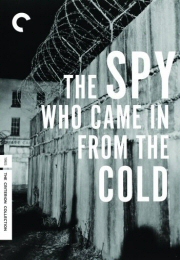 With the temperature dropping, it's time to find someone to keep you warm. Find your hookups with our online dating guide!
With the temperature dropping, it's time to find someone to keep you warm. Find your hookups with our online dating guide!
in from the Cold
- Rated NR
- Drama
- 1965
- Buy the DVD
Reviewed by Bob Westal
()
bout five decades ago, a young, real-life MI6 spook named David Cornwell became irritated by the popularity of a certain pulp fictional assassin for Her Majesty’s Secret Service. He took the pen name John le Carré, and commenced writing about a world of hard-working, habitually depressed British spies without a license to do much of anything they weren’t specifically ordered to do. Though his first two novels were relatively conventional mysteries, his style quickly evolved into tales that were immensely closer to reality but, in their way, no less brutal than the violent escapades of James Bond. His tendency to blend thriller writing with biting liberal politics continues into his 70s, including his more recent novels-into-films, “The Tailor of Panama” and “The Constant Gardener.”
“The Spy Who Came in from the Cold” is the film version of le Carré’s third, breakthrough novel – not just a great espionage tale, but also one of the great novels of the 20th century. The spy in question is Alec Leamas (Richard Burton), a burned-out hard case recalled to London in disgrace after his last Berlin agent is gunned down within a few feet of the Berlin Wall -- one of a series of British spies targeted by the vicious head of East German intelligence, Mundt (Peter van Eyck). Leamas’s code-name-only boss, Control (Cyril Cusack), knows he’s drinking heavily and on the edge of sanity, but he offers Leamas a chance at redemption and revenge. He is to make himself a target for recruitment by East German intelligence, become a double agent, and feed incriminating disinformation to Mundt's #2, an intellectual Jew named Fiedler (Oskar Werner) who will only too eagerly use the planted evidence to have his ex-Nazi boss shot. Prior to that, however, Leamas must attract the Stasi’s attention by dramatically hitting the skids. While working at the kind of job the English welfare state gives to educated drunks, Leamas meets Nan Perry (Claire Bloom), an idealistic young librarian who ironically enough turns out to be an ardent, card-carrying Communist. The two start up a love affair that turns out to be a lot more than a simple fling.
With a screenplay by Paul Dehn (“Goldfinger,” “Murder on the Orient Express”), a writer with real-life espionage experience of his own, “The Spy Who Came in from the Cold” represents some of the best and most purely cinematic work of the great Hollywood left-realist director, Martin Ritt (“Hud,” “The Front” and “Norma Rae”). It is, if anything, harsher and more unrelenting than the book. Le Carré was still a loyal member of Britain’s secret service when he wrote his novel, but director Ritt had few reasons to feel sympathy towards any spy agency of the west or east, and he brings a real sense of outrage to the proceedings. The results are potent enough to make you forget that less realistic movie spies even exist.
Particularly in its spectacular Criterion edition, probably the first thing you’ll notice about “The Spy Who Came in from the Cold” is its look. As if aiming for the polar opposite of the full-color imagery of the Bond films, right from the start Ritt, cinematographer Oswald Morris, and production designers Tambi Larsen and Hal Pereira, give us something completely different. Shot in black and white, an apt but uncommercial decision even at the time, the film opens with memorable nighttime imagery of the barbed wire-festooned Checkpoint Charlie, the only break in the Berlin Wall. The tale is told simply, and the tension created by the cold-blooded killing that starts things off never dissipates. The film’s emphasis on the grinding tedium and squalor of Leamas’s existence only heightens the drama as he falls in love and tries to redeem his life’s work.
Still, despite its heavy mood and intricate plotting, like most of le Carré’s stories, this is an almost entirely character-driven piece. Acting is crucial here – and first rate. According to le Carré, the stage-trained Richard Burton provided a major challenge for a method-oriented actor’s director like Ritt, and required constant nagging to scale his performance down to film size. You’d never know it. In fact, Burton seems perfectly cast and gives a near perfect, highly internal performance as Leamas. He creates a subtle, believable chemistry with Claire Bloom, a strong actress giving a perfectly understated performance as his sweetly bolshie love. Burton’s scenes with Oskar Werner (“Jules and Jim,” “Fahrenheit 451”) as the sympathetic Stasi agent are equally strong at conveying a wary friendship between two thorough professionals who are potentially deadly to each other.
The supporting cast is equally memorable. Standouts include Cyril Cusack as the borderline villainous MI6 chief, Michael Hordern as a pervy and pathetic low-level communist operative, and Rupert Davies as the polite, mostly well-intentioned agent, George Smiley – le Carré’s inherently decent, utterly repressed signature character who was later played by Alec Guinness in two acclaimed TV adaptations: 1979’s “Tinker, Tailor, Soldier, Spy” and 1982’s “Smiley’s People.”
If there’s anything at all wrong with “The Spy Who Came in From the Cold” it is that it is too pure in its intensity. There is plenty of tension, suspense, and even a great deal of wit, but there is not a lot of fun – not that there should be, but the film did pay a price for its grim tone at the box office. Later le Carré tales would bring back some of the fun of a great mystery story, but as suspenseful as it is, this is not really a thriller in the usual sense, but a bitterly disillusioned look at the human cost of the cold war. Le Carré’s book nevertheless offers at least the hope of some highly compromised good intentions among those fighting the Communist threat, but of course the author was still a member in good standing of MI6 when he wrote it. The film version, directed by a lifelong political outsider, offers only the bleak certainty of its own uncompromising logic. It’s one cold classic.
Criterion Collection DVD Review:
This exquisite DVD is another example of why Criterion gets to charge the big bucks. The newly restored digital transfer shimmers, revealing new depths to Oswald Morris’s great cinematography. The soundtrack, including Sol Kaplan’s truly unusual score, has also been powerfully remastered into ear-filling stereo – as far as I can tell the first time that “The Spy Who Came in From the Cold” has ever been heard in anything but monaural. The bonus disc includes hours of features, starting with a terrific new interview with the 70-something John le Carré in which he drops such tidbits as a casual assertion that screenwriter Paul Dehn – whose other scripts include both the historically based “Night of the Generals” and, because that’s the way things sometimes go in Hollywood, all of the “Planets of the Apes” sequels – had been a paid assassin. More personal details about the author himself and his unusual upbringing are discussed in a strong 2001 BBC documentary profile. Also included on the disc are a 1985 audio interview with the late Martin Ritt, a commentary on selected scenes by Oswald Morris, and an oddly revealing television interview with Richard Burton, who died in 1984, conducted by the legendary critic, Kenneth Tynan. In it, Burton directly contradicts many of the statements made about him by le Carré in the interview. As in a le Carré novel, discerning the final truth remains largely up to us.
You can follow us on Twitter and Facebook for content updates. Also, sign up for our email list for weekly updates and check us out on Google+ as well.











